【备考小升初】专项复习一般将来时课件
图片预览

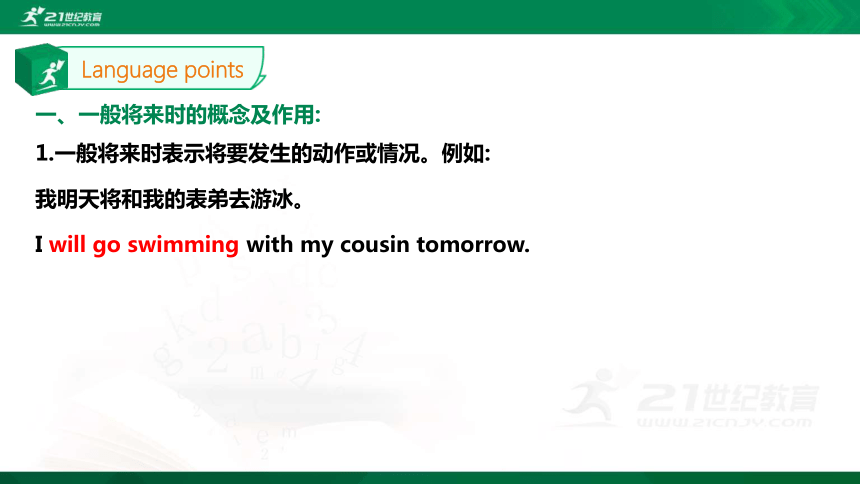
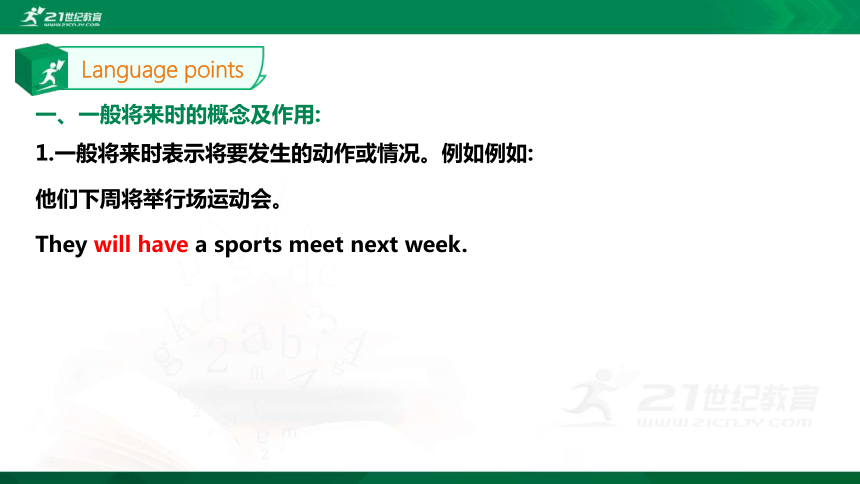



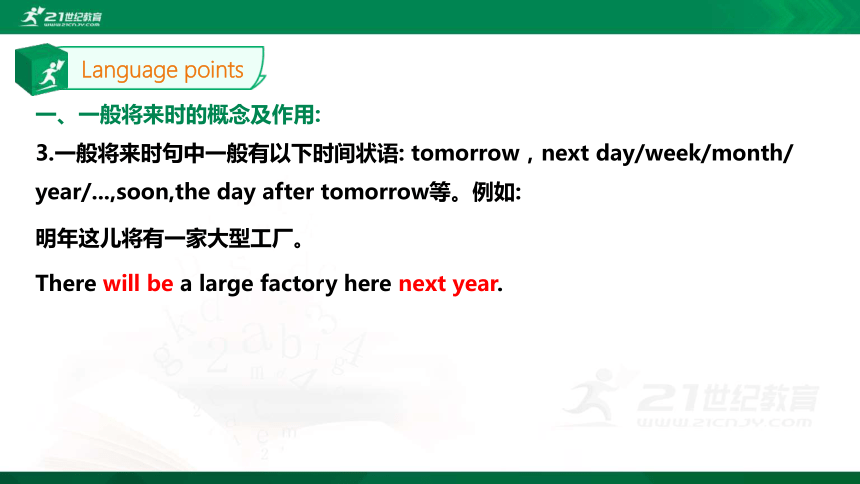
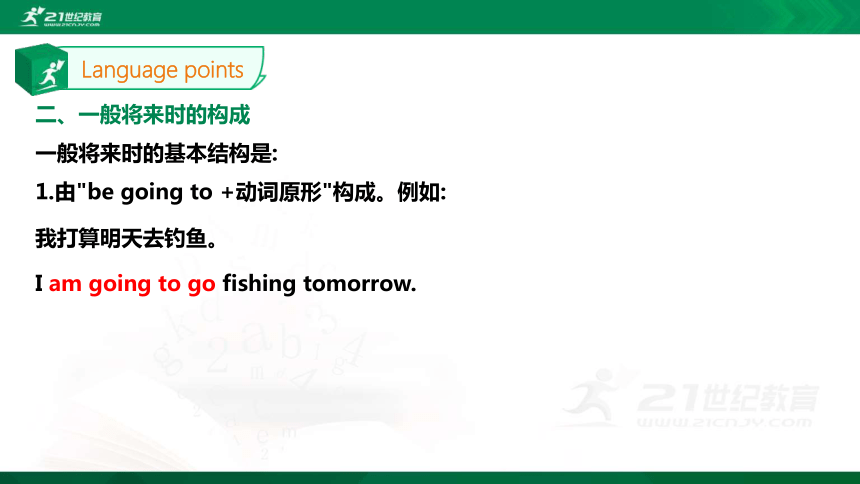
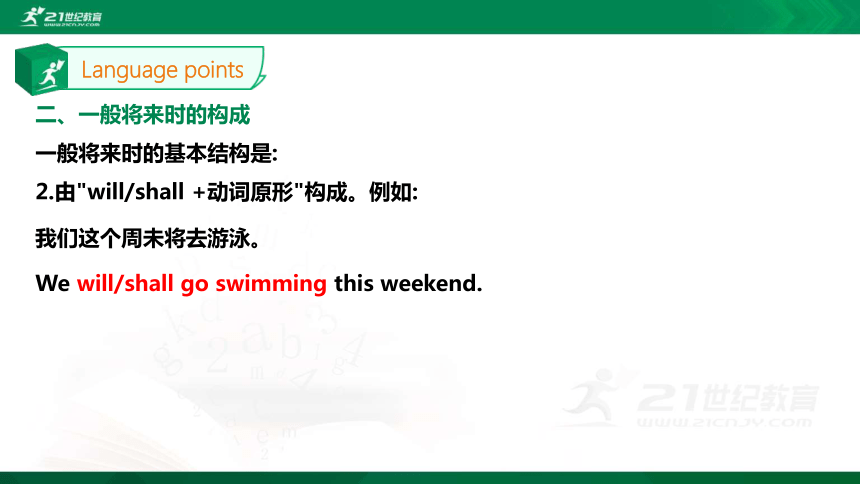
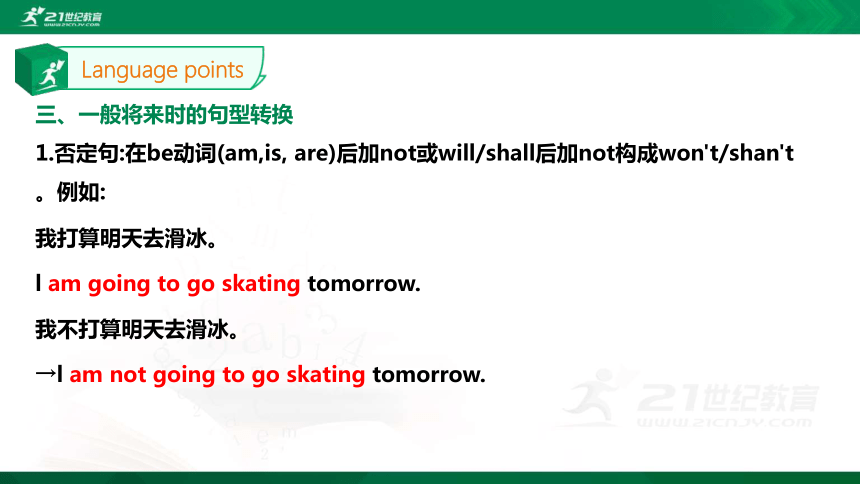

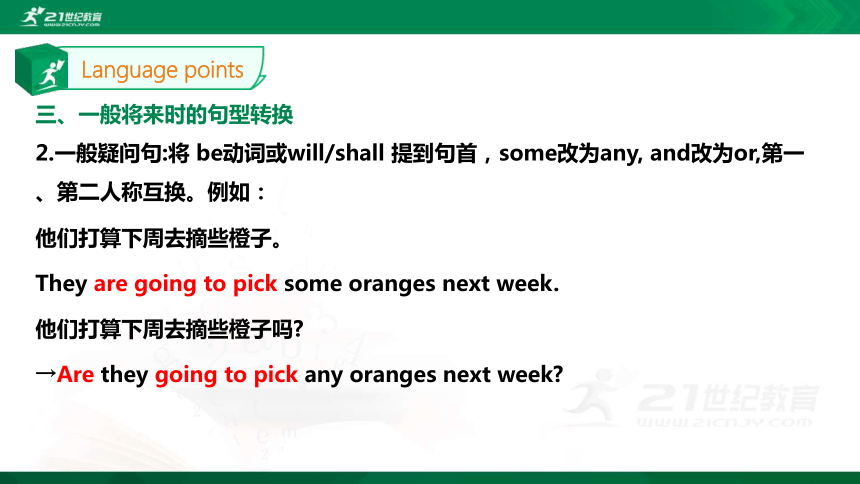
文档简介
(共32张PPT)
动词-一般将来时
通用版 小升初专题
一、一般将来时的概念及作用:
1.一般将来时表示将要发生的动作或情况。例如:
Language points
我明天将和我的表弟去游冰。
I will go swimming with my cousin tomorrow.
一、一般将来时的概念及作用:
1.一般将来时表示将要发生的动作或情况。例如例如:
Language points
他们下周将举行场运动会。
They will have a sports meet next week.
一、一般将来时的概念及作用:
2.有些动词,如come, go, leave等,也可用现在进行时表示将来。例如:
Language points
公共汽车就要来。
The bus is coming.
一、一般将来时的概念及作用:
2.有些动词,如come, go, leave等,也可用现在进行时表示将来。例如:
Language points
我们明天就去那儿。
We are going there tomorrow.
一、一般将来时的概念及作用:
2.有些动词,如come, go, leave等,也可用现在进行时表示将来。例如:
Language points
布菜克先生下周要离开香港。
Mr Black is leaving Hong Kong next week.
一、一般将来时的概念及作用:
3.一般将来时句中一般有以下时间状语: tomorrow,next day/week/month/
year/...,soon,the day after tomorrow等。例如:
Language points
明年这儿将有一家大型工厂。
There will be a large factory here next year.
二、一般将来时的构成
一般将来时的基本结构是:
1.由"be going to +动词原形"构成。例如:
Language points
我打算明天去钓鱼。
I am going to go fishing tomorrow.
二、一般将来时的构成
一般将来时的基本结构是:
2.由"will/shall +动词原形"构成。例如:
Language points
我们这个周未将去游泳。
We will/shall go swimming this weekend.
三、一般将来时的句型转换
1.否定句:在be动词(am,is, are)后加not或will/shall后加not构成won't/shan't。例如:
Language points
我打算明天去滑冰。
l am going to go skating tomorrow.
我不打算明天去滑冰。
→l am not going to go skating tomorrow.
三、一般将来时的句型转换
1.否定句:在be动词(am,is, are)后加not或will/shall后加not构成won't/shan't。例如:
Language points
我明天将去购物。
l will go shopping tomorrow.
我明天将不去购物。
→l will not go shopping tomorrow.
三、一般将来时的句型转换
2.一般疑问句:将 be动词或will/shall 提到句首,some改为any, and改为or,第一、第二人称互换。例如:
Language points
他们打算下周去摘些橙子。
They are going to pick some oranges next week.
他们打算下周去摘些橙子吗?
→Are they going to pick any oranges next week?
三、一般将来时的句型转换
2.一般疑问句:将 be动词或will/shall 提到句首,some改为any, and改为or,第一、第二人称互换。例如:
Language points
我明天将参观颐和园。
I will visit the Summer Palace tomorrow.
你明天将参观颐和园吗?
→Will you visit the Summer Palace tomorrow?
三、一般将来时的句型转换
3.特殊疑问句:由“疑问词+一般疑问句”构成。例如:
Language points
汤姆将去上学。
Tom will go to school.
谁将去上学?
→Who will go to school?
三、一般将来时的句型转换
3.特殊疑问句:由“疑问词+一般疑问句”构成。例如:
Language points
我父亲打算今天下午和我去看比赛。
My father is going to watch a race with me this afernoon.
你父亲打算今天下午和你去干什么?
→What is your father going to do with you this aferoon?
Improve
shall、will与be going to的用法
1. shall用于第一人称,will用于第二、三人称。例如:
我将为聚会买些花。
I shall buy some flowers for the party.
你将和我们一起去吗?
Will you go with us?
Improve
shall、will与be going to的用法
2.在以I或we作主语的问句中,一般用shall,此时表示征求对方的意见或是询问一个情况。例如:
我们看电视好吗?
Shall we watch TV?
我们明天有课吗?
Shall we have any casses tormorrow?
Improve
shall、will与be going to的用法
3. be goingto表示根据主观判断将来肯定发生的事情,will表示客观上将来势必发生的事情。例如:
天要下雨。
It is going to rain.
他们明天将回来。
They will come back tomorrow.
Practice
真题演练:翻译句子。
1. 王兵将要去看望他的叔叔吗?
答案:Will Wang Bing go to visit his uncle?
解析:此句说明将要发生的情况,故用一般将来时来表达。
Practice
真题演练:翻译句子。
2.我们步行去购物中心好吗?
答案:Shall we go to the shopping centre on foot?
解析:此句是表示询对方意见,故用“Shall we ...?“句式来表达。
Practice
真题演练:翻译句子。
3.她打算明天和她的父母起去远足。
答案:She is going to go hiking with her parents tomorrow.
解析:表示打算做某事,用 be going to do的结构表达。
Practice
随堂演练:用所给动词的适当形式填空。
1. Nancy and I __________________________________ (have) a picnic next Tuesday.
are going to have/will have
解析:句意:南希和我下周二将野餐。根据时间状语next Tuesday可以判断这道题的时态是一般将来时,一般将来时的构成是主语加be going to/will加do。
Practice
随堂演练:用所给动词的适当形式填空。
2. David ______________________________ (give) a puppet show next Monday.
are going to give/will give
解析:句意:下周一大卫讲表演木偶戏。根据时间状语next Monday可以判断这道题的时态是一般将来时,一般将来时的构成是主语加be going to/will加do。
Practice
随堂演练:用所给动词的适当形式填空。
3.一 _________ we ________ (play) football this afternoon?
一Sounds great!
Shall play
解析:句意:-这个下午我们能踢足球么?-听起来很棒!。此句是表示询对方意见,故用“Shall we ...?“句式来表达。
Practice
随堂演练:用所给动词的适当形式填空。
4. ________(be) Liu Tao going to my party?
Is
解析:句意:刘涛打算来我的聚会么?根据句意可知这是一个be doing to do结构的一般将来时的句子,在变成一般疑问句的时候,be动词提前,故答案为Is。
Practice
随堂演练:用所给动词的适当形式填空。
5. My uncle ________________________(come) to see us soon.
is coming/will come
解析:句意:一会我叔叔将要来看我。根据时间状语soon可以判断这道题的时态是一般将来时,一般将来时的构成是主语加be going to /will加do。
Summary
一、一般将来时的概念及作用:
1.一般将来时表示将要发生的动作或情况。
2.有些动词,如come, go, leave等,也可用现在进行时表示将来。
3.一般将来时句中一般有以下时间状语: tomorrow,next day/week/month/
year/...,soon,the day after tomorrow等。
二、一般将来时的构成
1.由"be going to +动词原形"构成。
2.由"will/shall +动词原形"构成。
三、一般将来时的句型转换
Summary
1.否定句:在be动词(am,is, are)后加not或will/shall后加not构成won't/shan't。
2.一般疑问句:将 be动词或will/shall 提到句首,some改为any, and改为or,第一、第二人称互换。
3.特殊疑问句:由“疑问词+一般疑问句”构成。
shall、will与be going to的用法
1. shall用于第一人称,will用于第二、三人称。
2.在以I或we作主语的问句中,一般用shall,此时表示征求对方的意见或是询问一个情况。
3. be goingto表示根据主观判断将来肯定发生的事情,will表示客观上将来势必发生的事情。
Homework
选择填空。
( )1. It is going to __________ tomorrow.
A. rainy B. be rain C. be rainy
( )2.一What are you going to _________?
一We are going to ___________.
A. do; swimming B. be; swim C. do; skate
( )3. It will ______ very cold next Sunday.
A. be B. is C. is going to
C
C
A
Homework
选择填空。
( )4. 一Are you going to see a play this Saturday?
一No.I ___________.
A. don't B. am not C. won't
( )5.一 __________ we go swimming tomorrow?
一Good idea!
A. Will B. Shall C. Are
B
B
谢谢
21世纪教育网(www.21cnjy.com) 中小学教育资源网站
有大把高质量资料?一线教师?一线教研员?
欢迎加入21世纪教育网教师合作团队!!月薪过万不是梦!!
详情请看:
https://www.21cnjy.com/help/help_extract.php
动词-一般将来时
通用版 小升初专题
一、一般将来时的概念及作用:
1.一般将来时表示将要发生的动作或情况。例如:
Language points
我明天将和我的表弟去游冰。
I will go swimming with my cousin tomorrow.
一、一般将来时的概念及作用:
1.一般将来时表示将要发生的动作或情况。例如例如:
Language points
他们下周将举行场运动会。
They will have a sports meet next week.
一、一般将来时的概念及作用:
2.有些动词,如come, go, leave等,也可用现在进行时表示将来。例如:
Language points
公共汽车就要来。
The bus is coming.
一、一般将来时的概念及作用:
2.有些动词,如come, go, leave等,也可用现在进行时表示将来。例如:
Language points
我们明天就去那儿。
We are going there tomorrow.
一、一般将来时的概念及作用:
2.有些动词,如come, go, leave等,也可用现在进行时表示将来。例如:
Language points
布菜克先生下周要离开香港。
Mr Black is leaving Hong Kong next week.
一、一般将来时的概念及作用:
3.一般将来时句中一般有以下时间状语: tomorrow,next day/week/month/
year/...,soon,the day after tomorrow等。例如:
Language points
明年这儿将有一家大型工厂。
There will be a large factory here next year.
二、一般将来时的构成
一般将来时的基本结构是:
1.由"be going to +动词原形"构成。例如:
Language points
我打算明天去钓鱼。
I am going to go fishing tomorrow.
二、一般将来时的构成
一般将来时的基本结构是:
2.由"will/shall +动词原形"构成。例如:
Language points
我们这个周未将去游泳。
We will/shall go swimming this weekend.
三、一般将来时的句型转换
1.否定句:在be动词(am,is, are)后加not或will/shall后加not构成won't/shan't。例如:
Language points
我打算明天去滑冰。
l am going to go skating tomorrow.
我不打算明天去滑冰。
→l am not going to go skating tomorrow.
三、一般将来时的句型转换
1.否定句:在be动词(am,is, are)后加not或will/shall后加not构成won't/shan't。例如:
Language points
我明天将去购物。
l will go shopping tomorrow.
我明天将不去购物。
→l will not go shopping tomorrow.
三、一般将来时的句型转换
2.一般疑问句:将 be动词或will/shall 提到句首,some改为any, and改为or,第一、第二人称互换。例如:
Language points
他们打算下周去摘些橙子。
They are going to pick some oranges next week.
他们打算下周去摘些橙子吗?
→Are they going to pick any oranges next week?
三、一般将来时的句型转换
2.一般疑问句:将 be动词或will/shall 提到句首,some改为any, and改为or,第一、第二人称互换。例如:
Language points
我明天将参观颐和园。
I will visit the Summer Palace tomorrow.
你明天将参观颐和园吗?
→Will you visit the Summer Palace tomorrow?
三、一般将来时的句型转换
3.特殊疑问句:由“疑问词+一般疑问句”构成。例如:
Language points
汤姆将去上学。
Tom will go to school.
谁将去上学?
→Who will go to school?
三、一般将来时的句型转换
3.特殊疑问句:由“疑问词+一般疑问句”构成。例如:
Language points
我父亲打算今天下午和我去看比赛。
My father is going to watch a race with me this afernoon.
你父亲打算今天下午和你去干什么?
→What is your father going to do with you this aferoon?
Improve
shall、will与be going to的用法
1. shall用于第一人称,will用于第二、三人称。例如:
我将为聚会买些花。
I shall buy some flowers for the party.
你将和我们一起去吗?
Will you go with us?
Improve
shall、will与be going to的用法
2.在以I或we作主语的问句中,一般用shall,此时表示征求对方的意见或是询问一个情况。例如:
我们看电视好吗?
Shall we watch TV?
我们明天有课吗?
Shall we have any casses tormorrow?
Improve
shall、will与be going to的用法
3. be goingto表示根据主观判断将来肯定发生的事情,will表示客观上将来势必发生的事情。例如:
天要下雨。
It is going to rain.
他们明天将回来。
They will come back tomorrow.
Practice
真题演练:翻译句子。
1. 王兵将要去看望他的叔叔吗?
答案:Will Wang Bing go to visit his uncle?
解析:此句说明将要发生的情况,故用一般将来时来表达。
Practice
真题演练:翻译句子。
2.我们步行去购物中心好吗?
答案:Shall we go to the shopping centre on foot?
解析:此句是表示询对方意见,故用“Shall we ...?“句式来表达。
Practice
真题演练:翻译句子。
3.她打算明天和她的父母起去远足。
答案:She is going to go hiking with her parents tomorrow.
解析:表示打算做某事,用 be going to do的结构表达。
Practice
随堂演练:用所给动词的适当形式填空。
1. Nancy and I __________________________________ (have) a picnic next Tuesday.
are going to have/will have
解析:句意:南希和我下周二将野餐。根据时间状语next Tuesday可以判断这道题的时态是一般将来时,一般将来时的构成是主语加be going to/will加do。
Practice
随堂演练:用所给动词的适当形式填空。
2. David ______________________________ (give) a puppet show next Monday.
are going to give/will give
解析:句意:下周一大卫讲表演木偶戏。根据时间状语next Monday可以判断这道题的时态是一般将来时,一般将来时的构成是主语加be going to/will加do。
Practice
随堂演练:用所给动词的适当形式填空。
3.一 _________ we ________ (play) football this afternoon?
一Sounds great!
Shall play
解析:句意:-这个下午我们能踢足球么?-听起来很棒!。此句是表示询对方意见,故用“Shall we ...?“句式来表达。
Practice
随堂演练:用所给动词的适当形式填空。
4. ________(be) Liu Tao going to my party?
Is
解析:句意:刘涛打算来我的聚会么?根据句意可知这是一个be doing to do结构的一般将来时的句子,在变成一般疑问句的时候,be动词提前,故答案为Is。
Practice
随堂演练:用所给动词的适当形式填空。
5. My uncle ________________________(come) to see us soon.
is coming/will come
解析:句意:一会我叔叔将要来看我。根据时间状语soon可以判断这道题的时态是一般将来时,一般将来时的构成是主语加be going to /will加do。
Summary
一、一般将来时的概念及作用:
1.一般将来时表示将要发生的动作或情况。
2.有些动词,如come, go, leave等,也可用现在进行时表示将来。
3.一般将来时句中一般有以下时间状语: tomorrow,next day/week/month/
year/...,soon,the day after tomorrow等。
二、一般将来时的构成
1.由"be going to +动词原形"构成。
2.由"will/shall +动词原形"构成。
三、一般将来时的句型转换
Summary
1.否定句:在be动词(am,is, are)后加not或will/shall后加not构成won't/shan't。
2.一般疑问句:将 be动词或will/shall 提到句首,some改为any, and改为or,第一、第二人称互换。
3.特殊疑问句:由“疑问词+一般疑问句”构成。
shall、will与be going to的用法
1. shall用于第一人称,will用于第二、三人称。
2.在以I或we作主语的问句中,一般用shall,此时表示征求对方的意见或是询问一个情况。
3. be goingto表示根据主观判断将来肯定发生的事情,will表示客观上将来势必发生的事情。
Homework
选择填空。
( )1. It is going to __________ tomorrow.
A. rainy B. be rain C. be rainy
( )2.一What are you going to _________?
一We are going to ___________.
A. do; swimming B. be; swim C. do; skate
( )3. It will ______ very cold next Sunday.
A. be B. is C. is going to
C
C
A
Homework
选择填空。
( )4. 一Are you going to see a play this Saturday?
一No.I ___________.
A. don't B. am not C. won't
( )5.一 __________ we go swimming tomorrow?
一Good idea!
A. Will B. Shall C. Are
B
B
谢谢
21世纪教育网(www.21cnjy.com) 中小学教育资源网站
有大把高质量资料?一线教师?一线教研员?
欢迎加入21世纪教育网教师合作团队!!月薪过万不是梦!!
详情请看:
https://www.21cnjy.com/help/help_extract.php
